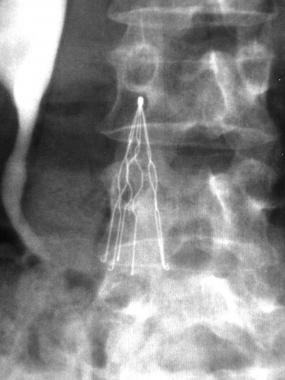A Mississippi man filed a lawsuit against C.R. Bard in December 2015 alleging that the Bard Eclipse inferior vena cava (IVC) filter caused him to suffer serious injuries and permanent damage. The lawsuit, although filed in Mississippi, is expected to join others consolidated in multidistrict litigation in the District of Arizona.
After being implanted with the Bard Eclipse Filter, the plaintiff claims that he began to experience serious symptoms and returned to his doctor, who discovered that the filter had tilted to an almost horizontal position, perforating the vena cava. It had also migrated to the point of overlapping the end of the patient’s venous stent and because of complications, can no longer be removed, creating a danger that the filter’s arms and legs will eventually fracture and migrate as well.
The plaintiff makes the following allegations against Bard:
- The company mis-branded the Eclipse as safe when it is not.
- Bard was aware of other safer designs that the plaintiff could have used.
- As a result of his injuries, the plaintiff has endured significant pain and suffering and will continue to do so, as the filter could not be removed and must be continually monitored.
In 2010, the U.S. Food and Drug Administration (FDA) issued its first safety alert regarding the increase of adverse reports related to IVC filters, and since then, the FDA and numerous studies have uncovered a widespread failure on the part of doctors to remove these devices once they are deemed no longer necessary.
Complications associated with IVC filters include:
- Punctures of the inferior vena cava
- Cardiac tamponade
- Aortic perforations
- Device embolization
- Filter fractures
- Migration of the device
- Ventricular Tachycardia, (an increased heart rate)
- Hemorrhagic Pericardial Effusion, or hemorrhaging around the heart
- Disruption of heart rhythm
Besides Bard, other IVC filter manufacturers, including Cook Medical, are the subject of a rising number of product liability lawsuits alleging serious harm and death caused by these medical devices.
Other IVC Filter Lawsuits News
An Arizona judge denied class certification for Bard IVC filter lawsuits, citing differences among plaintiffs' devices and claims. These lawsuits allege serious injuries from defective IVC filters and insufficient risk warnings.
A new study suggests IVC filters may increase pulmonary embolism risks in traumatic spine injury patients, raising concerns about their safety compared to other preventive treatments.
Studies reveal that Cook Medical’s Celect IVC filters may puncture the vena cava within two months, leading to serious complications and fueling thousands of lawsuits alleging defective design and failure to warn.
A recent study suggests IVC filters may be overused in managed care, often left in place longer than FDA guidelines recommend, raising concerns about patient safety and medical oversight.
Many IVC filters remain in patients indefinitely despite FDA recommendations for removal, raising concerns about serious complications such as fracture, migration, and vena cava perforation.
A new bellwether schedule has been issued in Bard IVC filter litigation, as thousands of lawsuits move forward alleging serious complications linked to the company’s retrievable devices.







